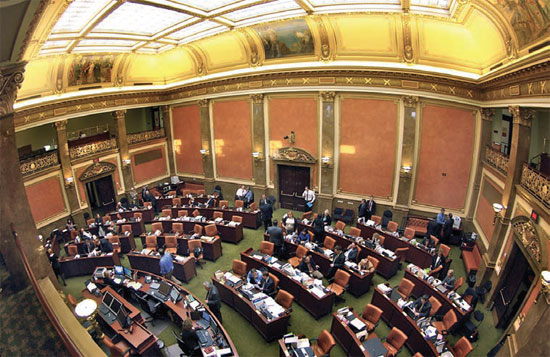Brice Wallace
If the state’s top political officials get their way, Utah’s service-oriented companies could face a bigger tax burden.
However, with the legislative general session underway, exactly how much of a burden remains a mystery.
Speaking at the recent Economic Outlook & Public Policy Summit in Salt Lake City, Gov. Gary Herbert, legislative leaders and others said the current sales tax system is not keeping up with changes in consumer spending habits and could jeopardize state government’s ability to provide services.{mprestriction ids="1,3"} The issue is no longer focused on collecting sales taxes on online purchases but rather a shift from a goods-based economy to a service-based one.
The sales tax structure has a shrinking base and is an outdated policy, Herbert told the crowd at the event, organized by the Salt Lake Chamber and Kem C. Gardner Policy Institute.
“It’s out of date. It’s out of balance, and now that base is now starting to shrink,” he said. “Back in the ’30s when we put in our sales tax program, it was mostly a goods-based economy. Now we’re shifting more and more and more to, in fact, service.”
The crux of the issue is that goods are subject to sales taxes while services are not, speakers said. In the 1980s, 70 percent of the economy was subject to sales tax, but it has shrunk to 40 percent now. “So, we’ve lost about 30 percent of the economy paying its fair share to help us run government,” Herbert said.
The governor noted in his budget proposal that some services are subject to sales and use taxes, including hotel accommodations, dry cleaning, car repairs and restaurant services. He suggests broadening the tax base and creating a lower rate, from the current 4.85 percent to something below 3.9 percent. To keep the system revenue-neutral, wide tax system changes could result in a rate perhaps as low as less than 2 percent, he said.
“So we’re going to be working closely with the Legislature to see what we can do to broaden the base and lower the rate and give at least a $200 million tax cut back to the people of Utah, and it will not only show and reflect the successes that we’ve had in the past but set us on a trajectory to make sure that we are, in fact, healthy going forward,” Herbert told the crowd.
Tax system modernization, he added, would “ensure our future growth, our future economic success, and maintain our lofty position of being the best place in America to live, to raise families and to do business.”
Several speakers used the analogy of a person years ago buying a lawn mower — subject to sales taxes — whereas a person now is likely to hire someone to mow their lawn, which is not subject to those taxes. And that has put a bind on state government, which relies on sales taxes for most of the services it provides except for education, which is funded by income taxes.
“We are changing how we consume, what we consume, and as we do that over time, our tax system hasn’t changed to adapt to our changing consumption patterns,” said Jonathan Ball, director of the Office of the Legislative Fiscal Analyst.
House Speaker Brad Wilson, R-Kaysville, stressed that the changes being contemplated would not generate increased tax revenue for the state. “We’re just have to fix the structural problems we have with the way we pay for the services that I think everyone cares about,” he said.
Among the options, he said, are making changes within the sales tax structure or making those changes along with alterations to income taxes.
“First and foremost, we need a tax structure and system that works and is sustainable but also does it in a way where we continue to have a really vibrant economy, where people continue to have employers that want to be here and grow here,” Wilson said.
“Now, the solution to the problem, we don’t know that we know it,” acknowledged Senate President Stuart Adams, R-Layton. “As we say, we listen to what the chamber says and what the business community says. No one wants to be taxed — none of us do — but we’ve got to find a solution.”
Adams said, however, that lowering the sales tax rate could make the tax issues worse.
“If you look, all the statistics I can see — national statistics — those states that focus on lowering their income tax have a better economy,” he said. “It’s statistically true that income tax is an economic driver, so if we’re going to lower taxes, that’s what tax we’re looking at.”
Herbert stressed that the marketplace is dynamic and that future economic changes will likely be seen in unmanned vehicles, transportation, communications, health and life sciences.
“It’s just amazing what the future is going to bring. We literally are kind of in the ‘Jetsons’ age,” he said. “Well, we need to understand our tax policy so that we can have an economy that reflects the opportunities that the marketplace puts out there and our tax policy reflects the changes in the marketplace.”
The changes need to be made while Utah’s economy is strong, he added, noting that “it wasn’t raining when Noah built the ark.”
“Why now? Because now is the time,” he said. “We don’t want to wait until we are in a crisis that we have to make changes.”
Whatever changes occur, Peter Reichard, president of the Utah Foundation, hinted that they won’t be the last. “Tax reform is a fact of life,” he said. “You never get to some magic formula where you just stop and say, ‘OK, we have the perfect tax system.’”{/mprestriction}








